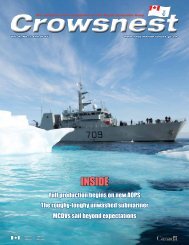You also want an ePaper? Increase the reach of your titles
YUMPU automatically turns print PDFs into web optimized ePapers that Google loves.
middle-<strong>Power</strong> navies will be unable to afford <strong>the</strong> large research <strong>and</strong> development expenses<br />
associated with new weapons technologies, <strong>and</strong> <strong>the</strong>y will probably wait to assess <strong>the</strong>ir operational<br />
effectiveness by larger naval <strong>Power</strong>s. 424 But even for <strong>the</strong> largest navies, incorporation <strong>of</strong> new<br />
technologies will be a function <strong>of</strong> technical insight, accessible expertise <strong>and</strong> institutional<br />
adaptability, none <strong>of</strong> which is guaranteed to be present <strong>and</strong> all <strong>of</strong> which will none<strong>the</strong>less confront<br />
<strong>the</strong> bureaucratic sluggishness for which all military institutions are notorious. 425 Even if a<br />
technological innovation is recognized as valuable, navies will still need to adapt tactics to ensure<br />
its most effective use; <strong>and</strong> that too could take considerable time <strong>and</strong> effort, with eventual success<br />
far from certain. <strong>The</strong> ultimate test always will always be survivability in combat. Failure to<br />
innovate could lead to inefficiencies in war-fighting <strong>and</strong> possible capability gaps, sometimes with<br />
dire consequences. Never<strong>the</strong>less, <strong>the</strong> absence <strong>of</strong> any guarantee that <strong>the</strong> potential <strong>of</strong> existing or<br />
new technologies will be understood <strong>and</strong> incorporated means that <strong>the</strong>re will always be an element<br />
<strong>of</strong> unpredictability concerning <strong>the</strong> relationship navies have with technological change.<br />
6.7 <strong>The</strong> Importance <strong>of</strong> Interoperability<br />
Interoperability at sea with allies <strong>and</strong> trusted international partners will be <strong>of</strong> increasing<br />
importance as a key enabler for operational <strong>and</strong> strategic success in maritime warfare <strong>of</strong> <strong>the</strong><br />
future. <strong>The</strong> high-intensity, multi-threat environment that characterises contemporary naval<br />
operations will also dem<strong>and</strong> a range <strong>of</strong> capabilities beyond what most modern navies possess or<br />
can afford to acquire. In 2012, <strong>the</strong> comm<strong>and</strong>er <strong>of</strong> <strong>the</strong> RCN, Vice-Admiral Paul Maddison, wrote<br />
that “[m]aritime warfare will require fully integrated <strong>of</strong>fensive <strong>and</strong> defensive joint action across<br />
all physical dimensions in <strong>the</strong> maritime domain—from <strong>the</strong> seabed to space—as well as full use <strong>of</strong><br />
<strong>the</strong> electromagnetic <strong>and</strong> informational environments.” “[S]uch operations,” he added, “will<br />
require far more than <strong>the</strong> bringing toge<strong>the</strong>r <strong>of</strong> a coalition at <strong>the</strong> time <strong>of</strong> crises. <strong>The</strong>y will require<br />
ever-higher degrees <strong>of</strong> interoperability to effect a merging <strong>of</strong> allied <strong>and</strong> coalition maritime forces<br />
at <strong>the</strong> technical, tactical <strong>and</strong> doctrinal levels…” 426<br />
However, what <strong>the</strong>orists assert is required will likely not be achieved—at least not in terms <strong>of</strong><br />
technological interoperability. <strong>The</strong> goal <strong>of</strong> a networked coalition fleet will almost certainly<br />
become more difficult to reach within <strong>the</strong> Western Alliance as <strong>the</strong> gap between <strong>the</strong> technology<br />
deployed on US <strong>and</strong> non-US naval platforms exp<strong>and</strong>s. <strong>The</strong> cost <strong>of</strong> keeping pace with <strong>the</strong> USN<br />
will be <strong>the</strong> principal reason. Leading naval <strong>Power</strong>s are already being forced to scale back earlier<br />
expectations. For example, as a cost saving measure, <strong>the</strong> UK announced in June 2012 that it<br />
would not be acquiring CEC for its newest warships. 427 While <strong>the</strong> decision was made for<br />
budgetary reasons, it will likely have a strategic impact on UK foreign <strong>and</strong> defence policy,<br />
undercutting <strong>the</strong> ability <strong>of</strong> Royal Navy ships to operate alongside <strong>the</strong> US Navy in high intensity<br />
operations. 428 O<strong>the</strong>r navies are facing a similar dilemma—whe<strong>the</strong>r to devote funds from already<br />
424 I am grateful to Daniel Salisbury for this observation.<br />
425 See, for example, Peter Marl<strong>and</strong>, “Post-war Fire Control in <strong>the</strong> Royal Navy”, John Jordan (ed.), Warship<br />
2014 (Conway: London: 2014), pp. 146–162.<br />
426 Vice Admiral Paul Maddison, “Strategic Trust <strong>and</strong> Cooperation”, <strong>Naval</strong> War College Review, Vol. 65,<br />
No. 4, Autumn 2012, p. 11.<br />
427 Thomas Harding, “Cutting Missile system leaves warships at risk”, <strong>The</strong> Daily Telegraph, 9 June 2012.<br />
428 “Lack <strong>of</strong> CEC Sensor Shooter Capability is a Major Error”, Warship – International Fleet Review (online),<br />
27 June 2012 [accessed on 4 September 2014 at www.warshipsifr.com/index.php?option=com_content&view<br />
=article&id=94:lack-<strong>of</strong>-cec-sensor-shooter-capability-is-a-major-error&catid=36:commentary&Itemid=65].<br />
DRDC-RDDC-2016-R085 85




